It seems we can’t find what you’re looking for. Perhaps searching can help.
Sign Up for newsletter!
Subscribe to get the latest eBook!
Hotline






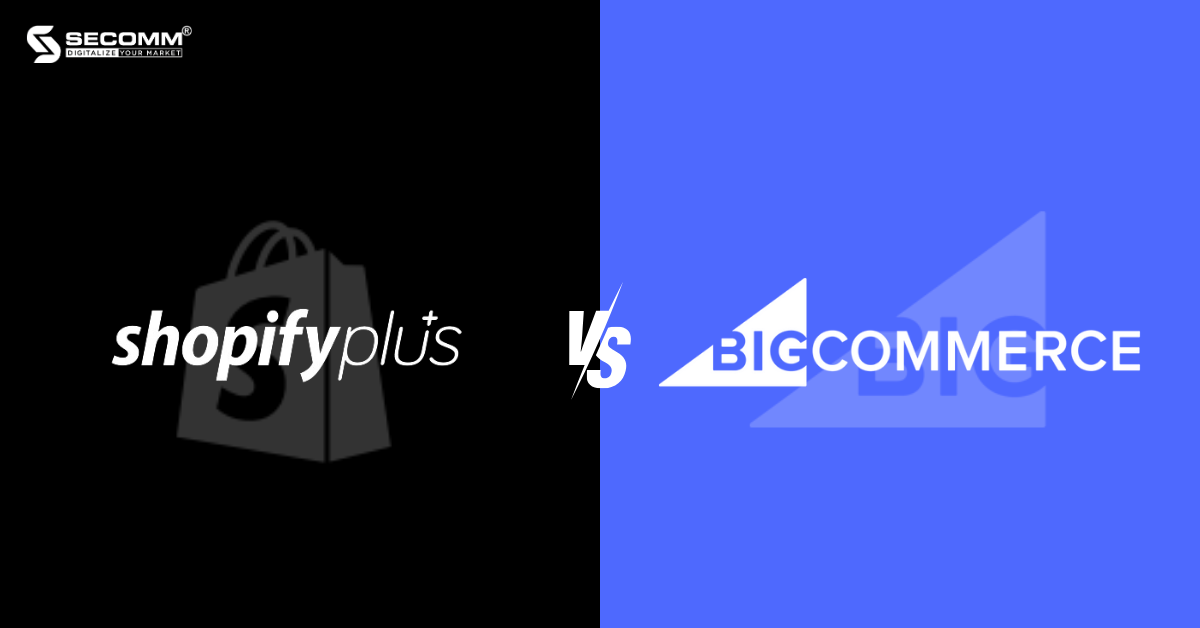
In today’s eCommerce landscape, it isn’t just open-source platforms that can meet the complex development and customization needs of large-scale enterprises, but SaaS platforms are also steadily rising with significant improvements. Among them, two SaaS platforms designed specifically for large enterprises are Shopify Plus and BigCommerce Enterprise.
However, these two platforms have many key differences. This article aims to clarify the pros and cons of each platform and compare the differences between the two platforms to help you — as a business leader — make well-informed decisions.
Learn more: Shopify vs BigCommerce: Which platform is right for you?
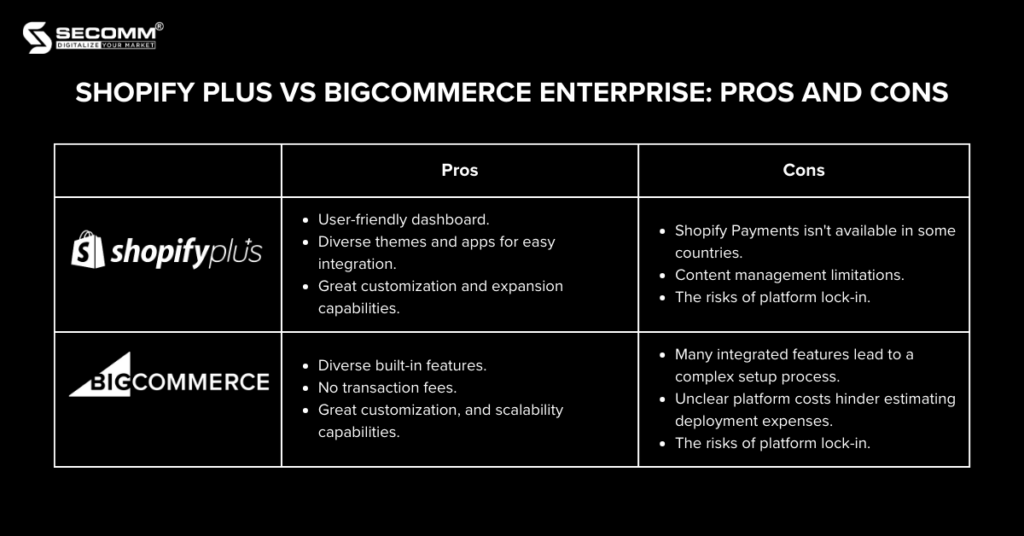
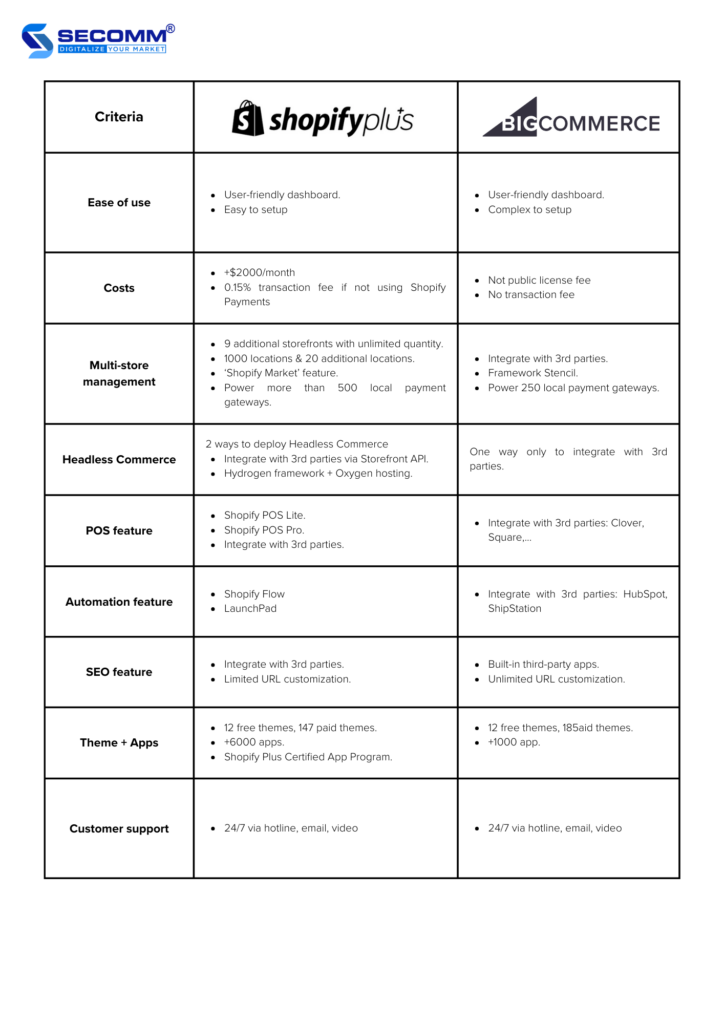
Both platforms are recognized for their user-friendliness compared to open-source platforms. Their intuitive dashboard and user-friendly navigation, along with features like drag-and-drop editing, extensive documentation, and 24/7 support, make them accessible for users of varying technical expertise.
However, Shopify, known for its inherent user-friendly design, ensures that users, whether using the Plus version or the regular ones, can easily explore and set up their eCommerce website with efficiency.
Both these two premium solution platforms — which are Shopify Plus and BigCommerce Enterprise — cater to the deployment needs of large enterprises, these platforms offer advanced features and technologies that require some learning.
For example, the ‘Plus’ users need to grasp the Liquid template language, while those opting for the ‘Enterprise’ may benefit from understanding the Google Cloud Platform for optimizing website performance.
BigCommerce, renowned for its built-in features, continues this trend with the ‘Enterprise’ version. Some features may suit specific businesses but might be unnecessary for others. While BigCommerce allows flexibility for customizing and configuring these advanced features, it can introduce complexity and intricacy into the setup process.
Similarly to other premium solutions on SaaS platforms, the license fee will depend on the deployment requirements and the current scale of the business. BigCommerce doesn’t disclose the fee publicly, requiring businesses to directly contact the platform for tailored consultation and pricing.
On the other hand, Shopify Plus has a license fee starting at $2000 per month. Once you reach a monthly revenue threshold of $800,000, the platform fee becomes revenue-based, amounting to 0.25% of monthly revenue, capped at $40,000 per month or $480,000 per year.
Considering transaction fees is also important. While BigCommerce doesn’t charge transaction fees, Shopify Plus charges a 0.15% transaction fee for not using Shopify Payments.
To estimate deployment costs effectively, you should partner with development agencies and engage in detailed consultations with BigCommerce or Shopify for comprehensive guidance.
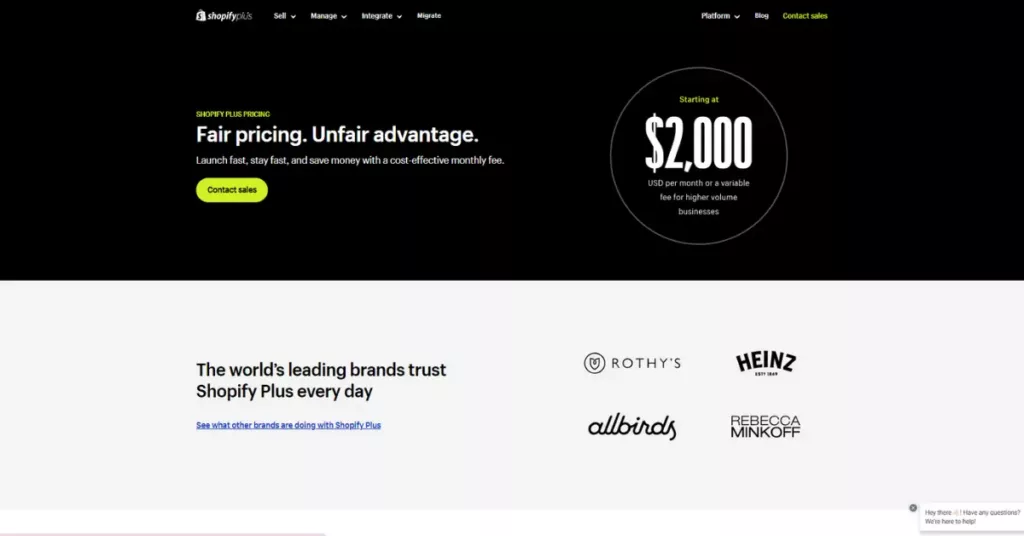
For large enterprises, the multi-store management feature is crucial and a primary consideration when selecting an eCommerce platform to sell globally. To engage in sales across various markets worldwide, your eCommerce website needs to be crafted to suit the preferences of each target audience in different markets.
This involves addressing issues related to language conversion, currency units, and payment methods with flexibility. Moreover, stores should be administered efficiently in a centralized manner rather than separately.
Shopify Plus allows you to create up to 9 additional storefronts alongside the main storefront at 1000 different inventory locations and 20 additional inventory locations. All these storefronts can be centrally managed through a single dashboard.
Plus, the Shopify Market feature will help you select the markets you want to sell in. The system will then automatically convert and manage multiple languages, currency units, shipping options, and payment methods based on the user’s IP address. Currently, Shopify Plus supports a range of local payment gateways, and you can refer to the provided list.

BigCommerce Enterprise doesn’t provide many solutions or features for global selling. Instead, it allows you to deploy multiple stores within the platform and then integrate with 3rd-party PIM solutions to manage data across these stores.
Another option is to leverage the BigCommerce Stencil framework to tailor content language for each local market. Also, the Enterprise version supports multi-currency payments through more than 250 local payment gateways.
The demand for adopting Headless eCommerce is on the rise, especially among large enterprises seeking to deliver a seamless and optimized experience for their customers. Both Shopify Plus and BigCommerce Enterprise offer effective solutions for going Headless.
BigCommerce Enterprise allows you to integrate with various frameworks (Next.js, Gatsby.js, Nuxt.js), APIs (REST, GraphQL), and your preferred or previously used tools.
When using Shopify Plus, there are three approaches. You can use the Storefront API to connect and develop with your preferred frameworks, hosting solutions, and tools. Or, you can leverage Shopify Hydrogen framework and Oxygen hosting to facilitate a headless eCommerce website flexibly.
Just like their regular pricing plans, both the ‘Enterprise’ and the ‘Plus’ include Point of Sale (POS) features for eCommerce transactions, catering to both online and offline stores, as well as Omnichannel operations.
POS can be configured on various devices like mobile devices (tablets, smartphones), and other hardware like cash registers and barcode scanners.
BigCommerce Enterprise offers smooth integration with third-party POS systems like Square, Vend, Clover, and Heartland Retail. It’s good for those who already using POS software from these third-party providers.
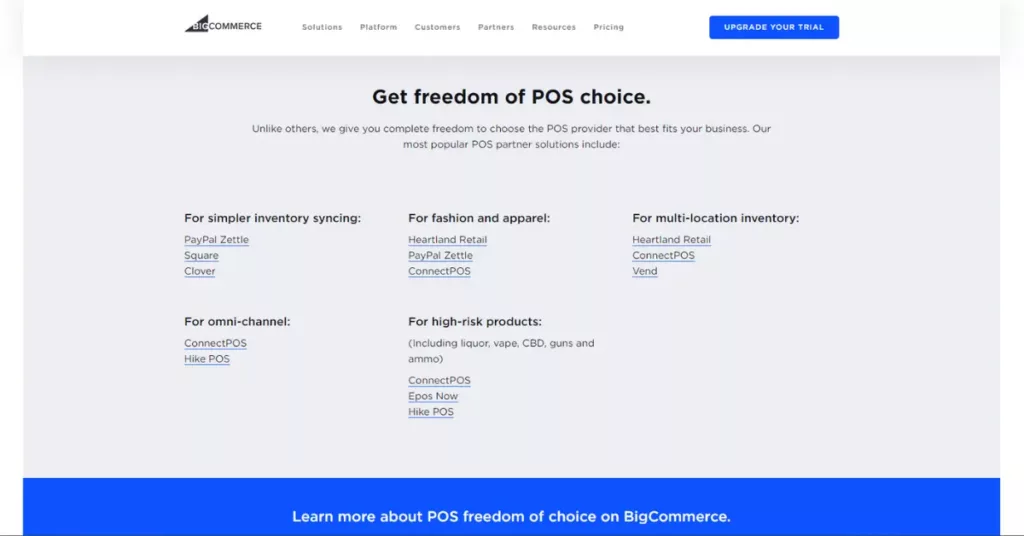
For Shopify Plus, beyond the option to integrate with third-party POS systems like BigCommerce Enterprise (Clover, Square, Zend), Shopify offers its own Shopify POS solution, available in two plans:
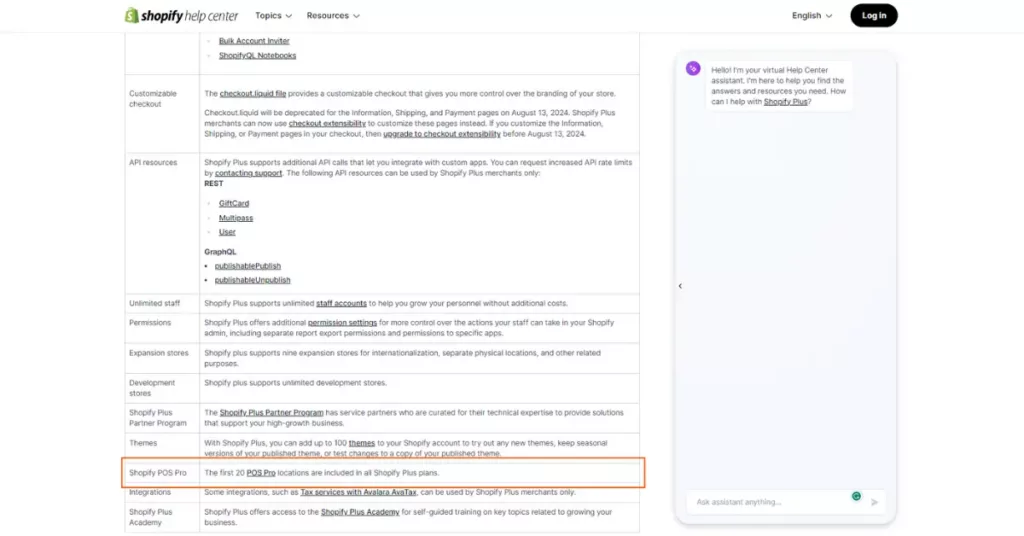
Both ‘Plus’ and ‘Enterprise’ offer tools and solutions to help you automate your eCommerce website operations.
Shopify Plus offers an exclusive solution, Shopify Flow, and LaunchPad, allowing you to automate routine tasks and set up automated workflows for tasks like email marketing campaigns or new product launches.
On the other hand, BigCommerce Enterprise takes a different automation approach which enables you to smoothly integrate with 3rd-party apps. Some of them are HubSpot, Avalara, ShipStation, etc.
SEO plays a crucial role in improving the search visibility of an eCommerce site and attracting potential customers. Both platforms offer features to enhance SEO efforts.
The ‘Plus’ stands out for its user-friendly interface and an integrated app ecosystem that can enhance SEO, incorporating tools such as Google Search Console and Analytics. However, it comes with limitations in URL control and customization.
The ‘Enterprise’, on the other hand, provides more versatile SEO capabilities, including complete control over URLs and integration with applications like Google Search Console and Analytics. It makes the process more intricate compared to Shopify Plus, involving additional setup operations.
Shopify Plus offers businesses approximately 12 free themes and 147 paid themes, with prices ranging from $150 to $380 per theme. On the other hand, BigCommerce Enterprise provides around 12 free themes and 185 paid themes, with prices ranging from $150 to $400 per theme.
Both platforms offer a wide range of visually appealing and mobile-friendly theme options. While the ‘Enterprise’ themes are characterized by elegant, tidy, and modern designs with highly customizable features, the ‘Plus’ themes can meet higher requirements for user experience, making navigation easier.

To facilitate efficient eCommerce deployment, the two provide vast app stores and extensions, tailored for ‘Plus’ and ‘Enterprise’ businesses. While both platforms offer free versions, access to comprehensive features requires a modest monthly fee.
Shopify Plus boasts over 6,000 apps and extensions, while BigCommerce Enterprise has around 1,000. This can be explained by Shopify’s widespread popularity among businesses and developers globally, providing them with ample documentation and resources for app and extension development, including the Shopify Plus Certified App Program.
For businesses that are ready to deploy the ‘Plus’ or the ‘Enterprise’ solutions, the demand for technical support and efficient eCommerce website operations is significant.
Both platforms receive high praise for their customer service. They offer 24/7 support via hotline, email, and video available in multiple languages. However, if you need specialized and complex technical support, Shopify Plus may be the preferable choice.
Final Thoughts
In the competitive business landscape, selecting the right platform for launching an eCommerce website is an important decision. Both Shopify Plus and BigCommerce Enterprise offer distinct advantages and cater to various business models.
Regardless of the platform chosen, you should prioritize the development and delivery of an exceptional shopping experience for your customers. eCommerce platforms serve as tools, and the ultimate key to success lies in an effective deployment strategy and great collaboration with a proficient team.
With extensive experience helping numerous businesses deploy diverse eCommerce development projects on both Shopify Plus and BigCommerce Enterprise, SECOMM boasts a team of seasoned experts capable of collaborating to create exceptional eCommerce experiences and help you enhance your brand positioning.
Reach out or directly call the hotline at 028 7108 9908 to explore how SECOMM can contribute to optimizing the potential of Shopify Plus and BigCommerce Enterprise for enduring your business success.
 2
2
 7,501
7,501
 0
0
 1
1Subscribe to get the latest eBook!
Hotline